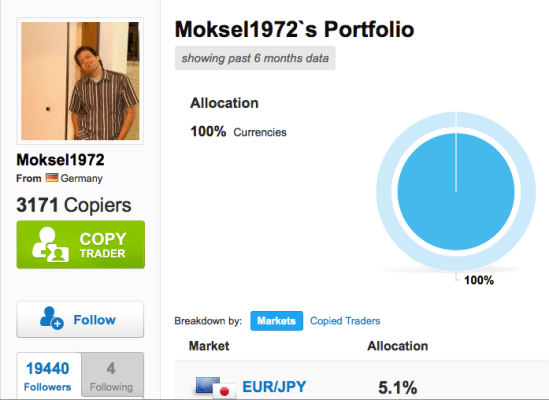eToro, the investment network that uses real-time features to let users follow and trade based on other users’ activities, has raised another $15 million in funding in a venture round led by Spark Capital with participation from existing investors BRM, Guy Gamzu and Jonathan Kolber. The new round takes the total amount of funding in the Israel-based company to $33.9 million.
Billing itself as a disruptive social trading platform, the company has seen some strong growth over the last year, and now claims to be the world’s largest online investment network, with more than 2 million users across 140 countries, with traded positions on the network growing by more than 500 percent in the period.
While there are a fair number of companies out there that cater to the armchair investor — letting individuals play the stock market without having to invest vast sums or deal with brokers — the unique thing about eToro (electronic bull, geddit?) is that it takes the investment model and gives it a kind of Twitter/Klout twist: the central feature of the site is a river charting what all of the other users are doing on the network, right there and then.
Then eToro takes that one step further: using its CopyTrader function, you can “follow” others on the network, to watch what they do, and even invest money to mimic their trading activities — a bit like going to a casino and putting money down on someone having a lucky streak at the Craps table. eToro says that on average the “win ratios” for those who copy traders is 80 percent.
The traders who get followed, as a result, have a double revenue stream: one from their trades (if they’re good) and one from those who copy their trades: Yoni Assia, the company’s founder and CEO, tells me that the company pays its members $10 per follower per month.
The most popular user at the moment, “Moksel1972” from Germany, has just over 3,000 copiers, and nearly 20,000 followers. For the record, he’s a currency trader and 99.6 percent of his trades have been profitable.
eToro, like other investing sites, takes a commission on the trades made — but otherwise does not charge for its service. Assia says this commission is competitive with those of other trading networks. Assia says its spreads are on average 0.03 percent of the value of the deal. (The spread varies between instruments between 0.03 percent to 0.1 percent.)
This is a compelling model, and one that has the opportunity of bringing in people into the stock market who have often thought of investing but have been reluctant to do so for lack of knowledge and experience. And the full disclosure on trades also pulls down the curtain on a process that a lot of people regard with wariness (especially in recent times, with all the banking fiascoes).
There is a lot of growth left to do for eToro. Assia says the new funds will be used to hire more employees — their numbers have already doubled in the last year to 200 in Europe, the U.S., Australia and Israel — and to invest in more R&D.
But there are other areas where we might also see some activity coming up: for example, the company has yet to properly launch in the U.S. — partly because it needs to still finalize licenses and partnerships (required by regulations) to be enable the “CopyTrader” service. Assia tells me that the company expects a proper U.S. entry later this year.
Equally, for the moment the company runs its platform as a retail-only operation, but Assia says that it is also speaking with a number of other institutions to white-label this service. “We are working with the top investment houses on a white label services, including a couple of banks and financial institutions,” he tells me. “That will give them the ability to offer our services on a wide consumer basis.” If that comes to pass, this may not be the last we see of this bull.
